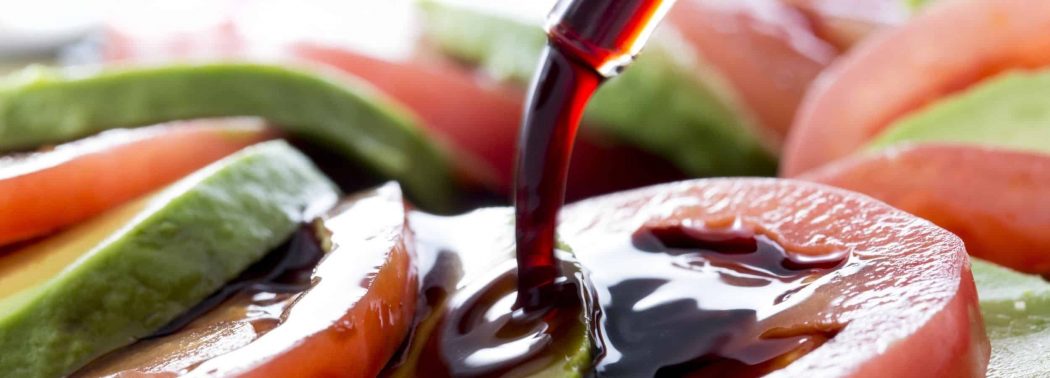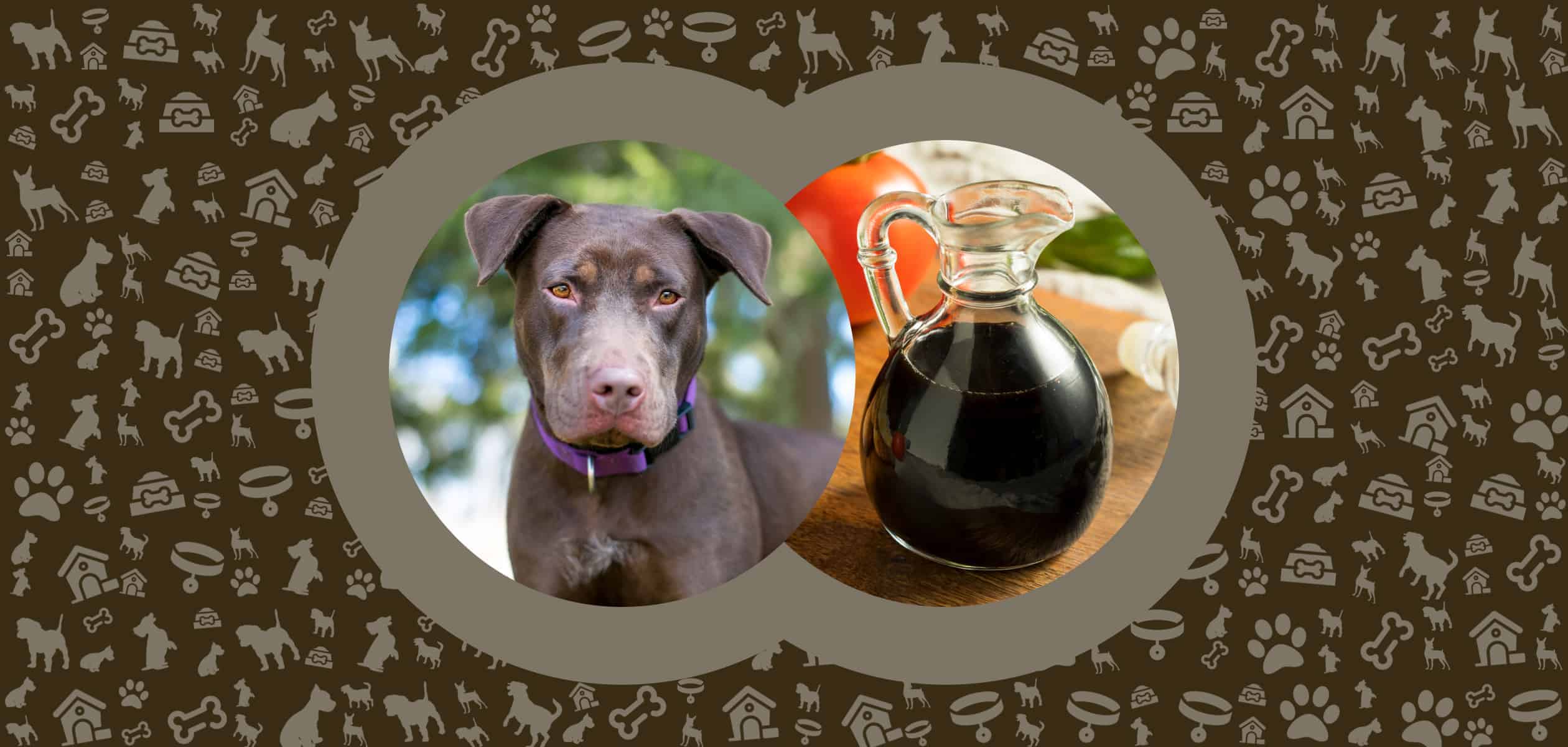Introduction
Balsamic vinegar is a flavored type of vinegar that was originally manufactured in Italy. In the past century or so, it became very popular with different cuisines, and it is not a common ingredient in salads and cooked food varieties. But can dogs eat balsamic vinegar?
Are there any risks involved in feeding dogs this type of vinegar? We’re answering these questions and more in today’s post, so keep on reading!
Is Balsamic Vinegar Good for Dogs?
No.
Despite balsamic vinegar being quite tasty and low-calorie, it is completely inappropriate to give to dogs. It is acidic and is made from some risky ingredients, all of which we are going to discuss in the following section of our article.
For people, though, this vinegar type has lots of health benefits, such as helping them to eliminate bacteria through their urinary system thanks to its antimicrobial properties or keeping their blood sugar levels in check. Unfortunately, dogs cannot get the same benefits.

Is Balsamic Vinegar Bad for Dogs?
Yes!
If you’ve ever asked yourself the question ‘Are dogs allowed to eat balsamic vinegar?’, we hate to disappoint you, but the answer is a hard no.
Here are several risks you are exposing your dog to when allowing them to have balsamic vinegar.
Local irritations
Depending on how sensitive your pet is, balsamic vinegar might manage to irritate your dog’s eyes. As such, if they have recently been diagnosed with conjunctivitis or nasal irritation, make sure that you do not keep this ingredient anywhere near your pet.
Grape toxicity
Balsamic vinegar is traditionally made from red wine, and red wine is made from red grapes. But did you know that dogs are actually allergic to grapes? Grape toxicity is real and can have significant negative effects on a dog’s health status.
Some symptoms that animals can experience after having balsamic vinegar in this sense are dehydration, kidney failure, loss of appetite, lethargy, and sometimes even seizures or coma.
Digestive distress
Due to its acidity, this type of vinegar can cause a number of digestive health issues in most dogs. Unless your pet’s stomach and gut are used to having highly acidic foods, they are likely to experience symptoms such as diarrhea, vomiting, retching, bloating, heartburn, and even foaming at the mouth.
Caramel toxicity
Not all balsamic vinegar varieties are created equal. The real thing, meaning the one that is actually imported from Italy and made from the best ingredients, can be quite expensive.
There are plenty of low-cost alternatives, so if you like the taste of it but can’t afford to spend a fortune, you might get a cheaper type of balsamic vinegar. The problem with this is that it can often have shady ingredients.
These varieties are essentially normal vinegar with added chemicals, sugar syrup, or caramel so that the product at least looks like its original counterpart.
These added sugars or the caramel itself can influence your dog’s body in a negative manner to the point that they experience signs such as appetite changes, stomach aches, tooth decay, or symptoms of high blood sugar. In time, dogs can also be predisposed to diabetes and obesity, which is worse.
Artificial sweeteners
Your local supermarket might have a low-calorie balsamic vinegar variety, and while it is definitely great for keeping your weight in check and maintaining normal blood sugar levels, it’s probably not the best option for your dog.
The reason for this is that in most cases, low-sugar or low-calorie foods and ingredients have artificial sweeteners added to their recipes. All of these substances are dangerous for dogs, including sorbitol, but the worst by far is xylitol.
There is no shortage of scientific papers documenting cases where dogs effectively died within a couple of hours after ingesting foods containing xylitol. It is incredibly toxic to them, and even the lowest amounts can make you end up in a hurry at the emergency vet clinic with your pet in tow.
Allergies
Are dogs allergic to balsamic vinegar? While not all of them have this type of allergy, you really can’t know for sure whether your particular pet does until you give it to them for the first time.
However, balsamic vinegar is not something that is a part of a dog’s normal diet, so unless you want your pet to suffer from anaphylactic shock besides all the other symptoms we have noted in this section, make sure you keep your vinegar stash in a well-locked cupboard or kitchen cabinet.
How Much Balsamic Vinegar Can My Dog Eat?
None! No amount of balsamic vinegar is safe for any dog, whether they are a healthy young adult or a senior with chronic health problems.
You might have come across various pieces of advice online from people who like to keep their dogs on a natural regimen and who occasionally add a bit of apple cider vinegar to their pets’ drinking water.
Apple cider vinegar and balsamic vinegar are two different things – the first isn’t made from grapes and doesn’t even have the same amount of sugar; plus, there’s no risk of caramel exposure since apple cider vinegar is transparent and light in color.
If you have any doubts about giving your dog balsamic vinegar, just ask your veterinarian. They’re likely to say the same, that any amount is unsafe.

Frequently Asked Questions
It depends on every dog. Some can experience severe digestive distress and have an episode where they vomit and have diarrhea throughout 24 hours or more. Others could be allergic and could develop hives or experience facial inflammation.
No. Even though part of the acid in balsamic vinegar is released into the air during any normal cooking process, that doesn’t make the resulting meal any safer.
Summary
So, can dogs have balsamic vinegar? The short answer is no. Balsamic vinegar is not a safe ingredient for this species, so you should do your best to steer your dog clear of any vinegar you might have stashed in your kitchen.
Sources
- Experimental acute toxicity of xylitol in dogs, Z. Xia et al, 2009
- Additives in pet food: are they safe?, J.M. Craig, 2021







Leave a Comment